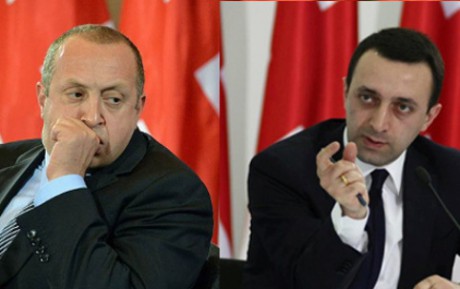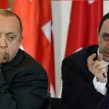
New Georgian Constitution Deepens Rift Between the President and the Prime Minister
Publication: Eurasia Daily Monitor Volume: 11 Issue: 164
By:

On September 11, an apparently frustrated Georgian President Giorgi Margvelashvili announced that his visit to the United States to attend and address the annual session of the United Nations in New York City was deliberately thwarted by Georgian Prime Minister Irakli Garibashvili and his office. Instead, only Garibashvili would attend and address the UN General Assembly (Imedi TV, September 11).
This announcement follows several months of intense bickering between Margvelashvili and Garibashvili, and their respective camps, as to who should depart for this year’s annual meeting at the UN. Both, the president and the prime minister insisted that the constitution grants him, and not the other man, the power to represent Georgia at international forums (Civil Georgia, September 11). In fact, Georgia came close to a major diplomatic embarrassment, when it almost ended up sending two separate, feuding delegations to the UN (Channel 1, Rustavi 2, September 10).
Overall, the deepening conflict between the head of state and the head of government as to whose prerogative it is to represent Georgia in foreign relations has become a highly destabilizing regular occurrence for almost a year now. The reason for this deepening conflict is the Georgian constitution itself. It suffers from the same exact problems as dozens of other countries’ national constitutions: overlapping and vaguely defined powers of the president and the prime minister. For instance, the constitution’s Clause 69, Paragraph 3 states that “the president represents Georgia in foreign relations.” However, just below that, Clause 78, Paragraph 1 declares that the cabinet “implements foreign policy” and further down, Paragraph 4 of the same clause states that the “prime minister […] represent[s] Georgia in foreign relations within his competence” (Constitution of Georgia, accessed September 15). The vagueness of this language and the seeming overlap of powers is all but clear here.
The current Georgian constitution was written in 2009, under the supervision of then-president Mikhail Saakashvili. The new constitution greatly weakened the powers of the president, retaining for the position some foreign policy functions, as well as the titles of Head of State and Commander-in-Chief. On the other hand, the new constitution greatly increased the powers of the prime minister, thus making him or her the most powerful political figure in the country. Overall, the constitution created a mixed presidential-parliamentary system of governance, with all of its vagueness and deficiencies. It was widely believed by the political opposition and portions of the Georgian public that Saakashvili deliberately weakened the office of president and strengthened that of prime minister in order to assume the now more powerful latter post once his presidential term was over in 2013 (The Messenger, October 7, 2010).
In any case, Saakashvili’s United National Movement (UNM) party lost the 2012 parliamentary elections and power went to Bidzina Ivanishvili’s opposition Georgian Dream (GD) coalition. And in 2013, the new constitution went into force in Georgia, a country already fraught with a myriad of staggering problems.
First and foremost, this intensifying bickering between the president and the prime minister is beginning to seriously impede Georgia’s ability to speak with one voice in its foreign relations. Specifically, as President Margvelashvili tries to assert a pro-Western vision, Prime Minister Garibashvili’s public statements tend to strike a more cautious and conciliatory (and often servile) tone toward Russia.
Certainly, neither Garibashvili nor Margvelashvili is more pro-Western or pro-Russian than the other man. This is not a conflict between two politicians with divergent foreign policy views. Rather, their public quarrels are all about consolidating their hold on power, as they are locked in an escalating power struggle. Both men were plucked from virtual obscurity by Bidzina Ivanishvili, the GD leader and former prime minister. Garibashvili was handpicked by Ivanishvili to replace him as head of the GD-led government, and Margvelashvili was heavily backed by Ivanishvili during the 2013 presidential campaign. Indeed, Ivanishvili’s loud and clear support was arguably instrumental in Margvelashvili winning the elections (see EDM, July 24, 2013; October 21, 2013; November 4, 2013).
Since then, Margvelashvili fell out with Ivanishvili, while Garibashvili stayed loyal to his patron. Now, President Margvelashvili is trying to chart his own political niche and path, while Prime Minister Garibashvili, backed by Ivanishvili from behind the scenes, is trying to undermine the sitting head of state and at the same time emphasize his own political standing at home and abroad.
Their infighting has not been limited to the question of who should attend this year’s UN General Assembly session. Since the beginning of this year, they have been engaged in a constant conflict about which of the two should sign the June 27 Association Agreement with the European Union. Finally, the president gave in (Imedi TV, Channel 1, May 21–27).
Moreover, their showdown extends beyond foreign policy issues. For instance, in August, the GD-dominated parliament turned down the president’s Supreme Court judge nominees (Imedi TV, August 1), while the president counterattacked by delaying to declassify the portion of spending records of former president Saakashvili (Civil Georgia, August 15). Moreover, Margvelashvili tried to increase the political role of the National Security Council, which is under the president’s authority (Rustavi 2, August 19). He has not had much success so far, however.
The main casualties of this deepening conflict between the president and the prime minister are the Georgian state’s national interests. As the conflict widens, it deprives the government the ability to respond with united effort to Georgia’s growing foreign and domestic challenges. Georgian politicians, however, appear to be confusing incessant political chaos, which they are causing, with the constitutional system of checks and balances, which they think they are utilizing.
Most likely, the political struggle between the Georgian president and the prime minister will continue over the coming months. The deficient Georgian constitution provides ample opportunities for such conflicts. And the more such clashes emerge, the more Georgia will suffer. This is certainly not a desired prospect for a country facing tremendous foreign policy and domestic challenges in a highly dangerous geopolitical region.




